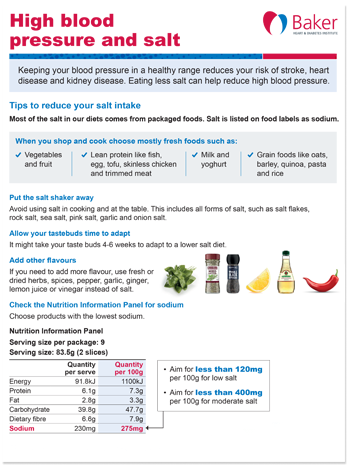 If you're living with high blood pressure, making simple changes to reduce your salt intake could help lower your blood pressure and protect your heart, brain and kidneys.
If you're living with high blood pressure, making simple changes to reduce your salt intake could help lower your blood pressure and protect your heart, brain and kidneys.
Here's something that might surprise you: most of the salt we consume — around 80% — doesn't come from the salt shaker. It's hidden in everyday packaged foods.
What you will learn in this fact sheet
This fact sheet is packed with practical information to help you take control.
- Simple, effective tips to cut back on salt.
- How dietary changes can help manage high blood pressure.
- Smarter choices when shopping and cooking.
- How to spot hidden salt by reading food labels.
Evidence-based strategies to reduce salt.
- Put the salt shaker away.
- Give your taste buds time to adapt.
- Add other flavours instead.
- Shop smart — reading nutrition labels.
- Choose products with the lowest sodium.
- Choose fresh foods when shopping and cooking.
Smart food swaps to reduce salt
- Instead of high-salt deli meats choose lean mince or grilled chicken.
- Instead of smoked foods choose canned salmon in spring water, turkey breast or egg.
- Instead of high-sodium sauces:
- use salt reduced soy sauce instead of regular soy sauce
- use canned tomatoes instead of cooking sauces
- use no added salt stock instead of stock powder
- choose salt reduced gravy options.
- Instead of salty snacks choose unsalted nuts, air popped popcorn or fresh fruit.
- Take care when eating out to avoid extra sauces and dishes with cheese.
Download your free fact sheet
The contents of this fact sheet were last updated December 2024
Supporting vital heart health research
This evidence-based fact sheet was developed by the Baker Heart and Diabetes Institute, where researchers have been advancing cardiovascular health for decades.
Help us continue providing free, expert health resources. Your support enables us to:
- Develop more comprehensive fact sheets like this one.
- Conduct research that informs better blood pressure management.
- Make evidence-based health information freely accessible to all Australians.
Support our research and free resources
Your donation helps ensure we can continue creating and updating valuable health guides for the community.
Other helpful lifestyle choices for high blood pressure
Beyond salt reduction, other proven strategies to lower your blood pressure include:
- Achieve and maintain a healthy body weight and waistline.
- Participate in daily physical activity and reduce sitting time.
- Drink less than 2 standard alcoholic drinks in a day.
- Take medications recommended by your doctor.
- Get support to reduce or stop smoking.
- Eat foods that have potassium — including 2 serves of fruit and 5 serves of vegetables each day.
Important note: If you have kidney disease, check with your doctor or dietitian before eating more foods that are high in potassium.
About the Baker Heart and Diabetes Institute
The Baker Heart and Diabetes Institute is a leading medical research institute dedicated to reducing the impact of cardiovascular disease and diabetes through research, education, and community programs.
Your support makes a difference. Consider donating to help us continue developing trusted, evidence-based health resources and advancing medical research that benefits all Australians.
Disclaimer
While reasonable efforts have been made to ensure the accuracy of this material, the information is provided on the basis that persons undertake responsibility for assessing the relevance and accuracy of its content. In particular, readers should seek independent professional medical advice from their general practitioner or specialist in relation to their own individual circumstance or condition before making any decisions based on this information. The material also includes summarised guidelines or recommendations based on information provided by third parties. The Baker Heart and Diabetes Institute disclaims to the extent permitted by law, all liability including negligence for claims of losses, expenses, damages and costs that the reader may incur (or suffer) from acting on or refraining from action as a result of all information in these materials.

